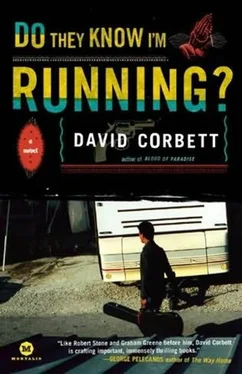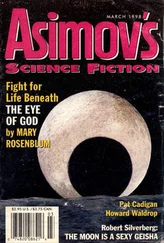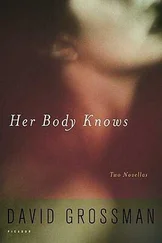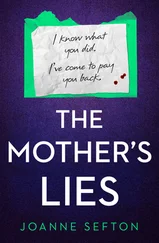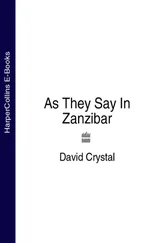Given Tío Faustino’s exhaustion, Roque again assumed driving duties, Beto taking the seat beside him, the other three in back. He suffered a vague wish to say goodbye to Julio but he realized the sudden vanishings of strangers from Arriaga would be nothing new.
Checking his rearview, he saw the three of them-Samir, Lupe, Tío Faustino-in uneasy slumber, Lupe leaning against Tío Faustino’s shoulder, her head sliding vaguely toward his chest, while his uncle protectively circled an arm around her shoulder. Roque felt grateful the two of them had grown closer, at the same time secretly wishing it were him back there.
They reached Juchitán a little before midnight and Roque was surprised by its sprawl. Beto gave him directions away from the old center of the city to a more industrial district near the bay, but before they veered too far afield of the nightlife they passed several bars where astonishingly large women, dressed elegantly in traditional traje , sat in chatty clusters at outside tables, fanning themselves in the lamplight. Taking stock of one particularly hefty mamacita wearing a ballooning green pleated skirt, a white huipil , even a mantilla, Beto chuckled. “You don’t know about this, I’ll bet. This town is famous for its homos. There’s like three thousand muxes -that’s the Zapotec word-who live here. It’s a matriarchal society, queer sons are considered good luck, as long as you only have one. Mothers like them because they don’t marry and go away. They’re usually good earners too. And because virgin girls are still prized down here as brides, a lot of guys pop their cherries on muxes .”
He directed Roque into a nest of warehouses near the water and finally down a dark callejón to a nameless bar. Opening the passenger-side door, he said to keep the motor running, he wouldn’t be long. Roque switched off the headlights, threw the transmission into park and slid down in his seat, watching as Beto pulled back the bar’s narrow tin door and vanished inside.
A weather-worn poster for Zayda Peña, a singer, was tacked up to the bar’s outside wall. Roque recognized the name from news reports. She was one of a dozen or so musicians on the grupero scene, Mexico’s version of country-western, who’d been murdered the past few years. Some of those killed had recorded narcocorridos , ballads touting the escapades of drug lords, a surefire way to piss off rivals. None of the murders had been solved. As though to drive that point home, somebody’d shredded the poster with the tip of a knife to where it looked as though a giant cat had come along to sharpen its claws on Zayda’s face.
Glancing over his shoulder, he caught Lupe disentangling herself from Tío Faustino’s arm, stretching, yawning, finger-combing her hair. You’re such a sap, he thought, mesmerized. At the same time he realized he could be looking at the next Zayda Peña. You pay for the company you keep. And yet when somebody walks up, says he loves your act, tells you he wants to bankroll you, turn your dream into your future, knowing as you do how hard you’ve worked, how few musicians catch a break, how many give it up or lose their way, is it really such a sin to say yes? Is it really a sign of virtue to shrink away, turn down what, for all you know, is the last real chance you’ll get?
The door to the bar opened again but it wasn’t Beto who emerged. A wiry man with a burdened slouch and artfully slicked-back hair stepped out into the street and rummaged a cigarette pack from his hip pocket. As his match flared, Roque got a glimpse of his features: less Mayan, more mestizo, with strangely bulging eyes like the clown Chimbombín.
But that wasn’t the troubling part. This wasn’t California. The guy didn’t need to step outside to grab a smoke.
Roque eased his hand toward the gearshift, ready to slam it into drive, leave Beto behind if need be, waiting for the bug-eyed stranger to make a sudden move.
Beto strode out of the bar and past the other man without a glance. The passenger door opened, the overhead light flared on, the door slammed shut. He just sat there in the dashboard glow for a moment, his exotically handsome face a mask.
Finally: “They’ve got checkpoints all over the inland roads. Strange. Usually they focus on one, the others are clear, switch it around every few days. We have to keep on the coastal route all the way through Oaxaca, past Puerto Escondido.”
It took a second for the name to register. Roque said, “That’s where the boats run by El Chusquero-”
“Tell me something I don’t know.” Beto leaned over, checked the gas gauge, then glanced up and finally noticed the bug-eyed man with the greaser hair. “What’s this turd want?”
Finishing his cigarette, the stranger tossed down his butt, crushed it with his boot and shuffled back inside the bar.
Tío Faustino edged forward. “You think that gangster-Captain Quintanilla, El Chusquero, whatever he’s calling himself today-you think he has something to do with closing down the inland roads? Maybe he’s paid somebody off. Maybe he has connections inside the military here, or the police. There could be somebody waiting for us up ahead.”
Beto stared at the bar’s tin door. “No. Fucking coincidence, that’s all. Bad luck.” Reaching his arm out the window, he slapped the side of the door hard three times. “Come on. Let’s move it.”
A FEW MILES OUTSIDE OF TOWN THEY ENCOUNTERED THE INFAMOUS wind, notorious for jackknifing trucks. The barrancas below were a graveyard, Beto said, not just the semis but the cars they dragged with them over the cliffs. Tío Faustino took the wheel. Despite a hairy sideways jolt now and then, he kept the Corolla on course, whistling under his breath to soothe his nerves, then asking Lupe to keep him awake with a song or two. Stirring herself from her inwardness, she resorted to the usual repertoire, “Es Demasiado Tarde,” It’s Too Late, coming first, sung sotto voce, almost a whisper, then “El Camino,” The Road:
De lejos vengo yo a verte
a conseguir lo que quiero
Aunque la vida me cueste .
I’ve come from far away to see you
to get what I long for
Even if it costs me my life
They passed through Salina Cruz hours before dawn but the city was already stirring, the refineries bristling with light, bakery trucks roaming the streets. The road out of town followed the coastal hills for miles, the winds again rocking the car back and forth as Roque huddled against the door, trying to grab some sleep.
As they passed a dirt lane a pair of headlights flashed on, then a pickup eased out onto the road behind them, followed by a second pickup trailing the first.
Beto turned around in his seat, looking back through the rear window. “If you can pick up speed,” he told Tío Faustino, “it might be a good idea.”
Samir wiped at his nose with the back of his hand, a fear reflex. Lupe glanced over her shoulder, her face both brightened and shadowed by the oncoming headlights. Following her eyes, Roque could make out the silhouettes of men standing in the first pickup’s truck bed, clutching the railing along the sides with one hand, weapons in the other.
Tío Faustino accelerated, taking the switchbacks fast and tight, hoping to lose the pickups that way-they’d have to slow down at each sharp turn or risk losing the men holding on in back. But even with his best efforts, come every straightaway the two small trucks made up lost ground, though the second seemed to lag seriously behind the first. Finally the crack of gunfire, bullets whistling past.
“You gotta outrun them to the next roadblock,” Beto told Tío Faustino.
Читать дальше
